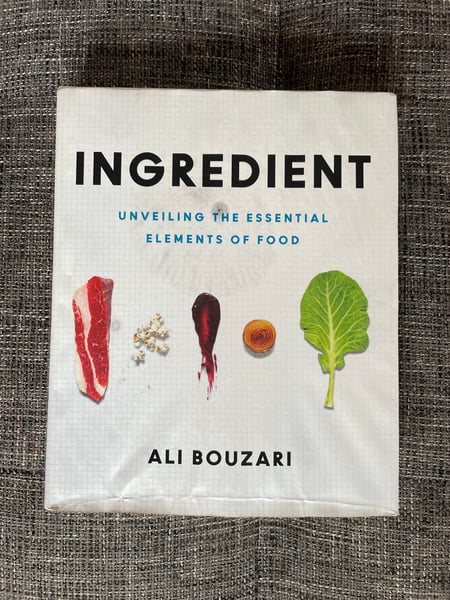
As a self-taught chef, I quite literally wouldn’t have a career if it weren’t for food and cooking books. There are few resources as important in developing an understanding of the different cooking styles and techniques used in professional kitchens the world over. Not to mention knowledge of ingredients, basic skills, plating styles, novel ingredient combinations, and a nearly endless list of other topics. Sure you could go to YouTube and find a tutorial on many different kitchen related subjects, but you simply won’t find the breadth or depth of knowledge that is available in print. Not to mention there are books that cover things far too esoteric or arcane to be found online.
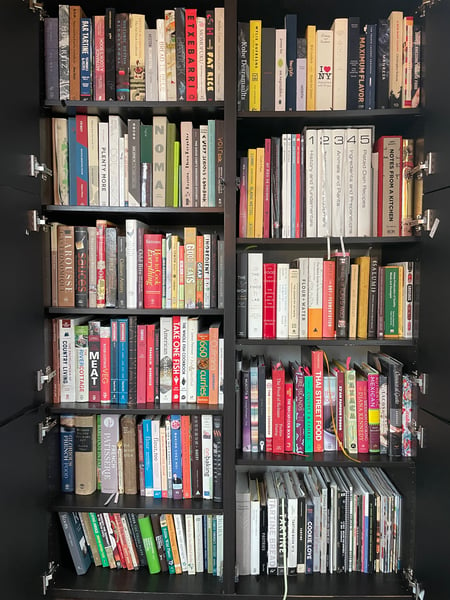 This is why food and cooking can be such an intimidating subject to try to master. There is just so much to learn that it can seem impossible to decide where to begin. There are hundreds of different regional cuisines across the globe, and each one has a suite of techniques, many of which may be unique. You could study for a lifetime and still not completely know even one style of cooking. Indeed, some would say certain regional cuisines are unknowably infinite.
This is why food and cooking can be such an intimidating subject to try to master. There is just so much to learn that it can seem impossible to decide where to begin. There are hundreds of different regional cuisines across the globe, and each one has a suite of techniques, many of which may be unique. You could study for a lifetime and still not completely know even one style of cooking. Indeed, some would say certain regional cuisines are unknowably infinite.
So how does one begin to educate themselves on a topic so vast? Well since books are kind of my thing (problem), let me act as a guide and introduce you to five books which I think constitute a great framework from which to begin to understand any type of cooking you might be interested in.
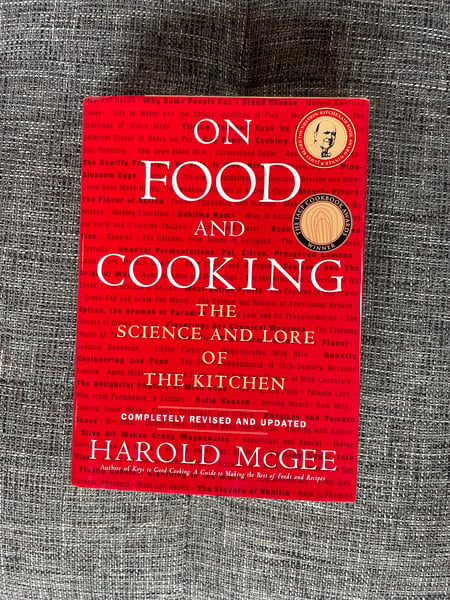 On Food and Cooking by Harold McGee:
On Food and Cooking by Harold McGee:
An absolute must read. To many, this is the book that began to usher in the era of understanding the why as well as the how when it comes to cooking. It has inspired countless of the most well regarded chefs on the planet, and McGee’s legendary reference tome is so packed full of fascinating arcana that it is one of very few reference books I own that I would recommend reading cover to cover at least once. The book is broken up into 15 chapters that run the gamut from milk and dairy, to meat, to herbs and spices, grains, doughs, through to the microbiology of food molecules and everything in between. Want to know the exact temperature at which egg yolks begin to coagulate? Look here first. Want a comprehensive table of all the major flavor compounds in dozens of herbs and spices? Just check pages 392-393. In the words of Daniel Boulud, “This book is… a must for every cook who possesses an inquiring mind.”
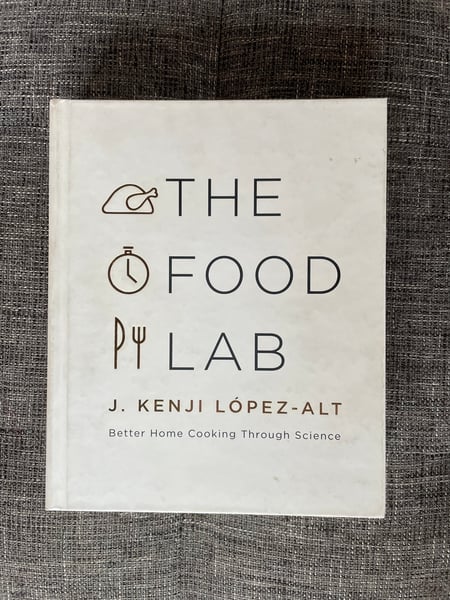 The Food Lab by J. Kenji Lopez-Alt:
The Food Lab by J. Kenji Lopez-Alt:
Kenji Lopez-Alt is probably the most well known author on this list thanks to his oeuvre comprising the likes of Serious Eats, America's Test Kitchen, The New York Times, and now his thriving YouTube channel. If Harold McGee started the tradition of explaining the ‘why’s’ of cooking, Kenji has made it his mission to bring the knowledge to the people. The Food Lab (named for his Serious Eats column of the same name) opens into tremendously useful conversion charts that alone would be worth the purchase price for how easy they make decoding all the terms you’re likely to find in basically any recipe written in English. Never again wonder exactly how big is an “extra large” egg (64 grams). Beyond the first couple pages the book goes on to explain in illuminating detail the how’s and why’s behind the most commonly used home ingredients and techniques. The book is replete with full color photos, full step-by-step guides, interesting asides, and delicious, meticulously tested recipes to tie it all together.
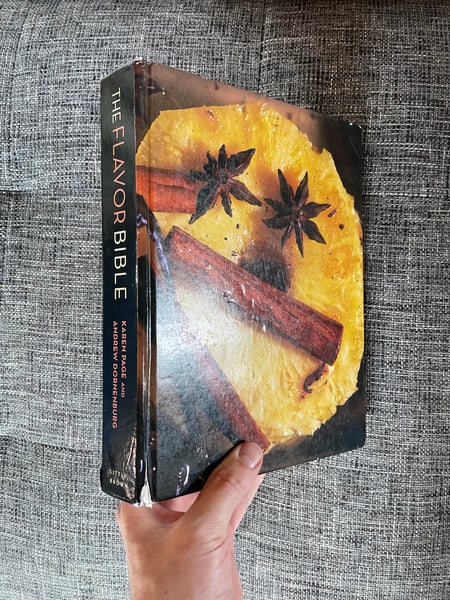 The dust jacket on this book is being kept safe in another location (I swear I know where), thus it is not pictured here.
The dust jacket on this book is being kept safe in another location (I swear I know where), thus it is not pictured here.
The Flavor Bible by Karen Page and Andrew Dornenberg:
This was one of the first books on cooking that I bought for myself. It's basically a gigantic index of hundreds of the most common cooking ingredients and below each entry is a list of ingredients that pair well with it. For instance, the entry for crab lists as possible pairings: aioli, apples, artichokes, asparagus, avocados, bacon, basil, bay leaf, bell peppers, and then continues in that fashion for a full page. To cut through the noise, the book employs a system of bolding and capitalizing pairings to show how frequently a pairing was suggested. The data was generated through personal interviews with hundreds of working professional chefs. The authors would ask about a given ingredient and the chef would list things they would pair with it. The more frequently a particular pairing came up in the interviews, the more prominently its featured in the published list of pairings. In addition to this, each entry also has stats about how it works in recipes, tips for working with it, and—for certain entries—a list of “flavor affinities.” These are whole groups of ingredients that all work well together like figs + honey + mascarpone, or chicken livers + bacon + balsamic vinegar + onions + rosemary. This is one of the most referenced book in my collection, and I still go back to it frequently to this day.
This book will change the way you cook by giving you a deep understanding of the fundamental building blocks of all ingredients. Instead of memorizing all the different ingredients and techniques you can use to thicken a sauce, this book allows you to understand how and why sauce thickening works. It gives you the tools to generate novel solutions to old problems simply by understanding how the physical system behaves, and how to get it to do what you want. That may sound complicated, but Bouzari lays it all out in an extremely straightforward and organized way, depicted throughout with clear photographs and beautiful illustrations. The book covers topics like the physics of water, heat transfer, protein coagulation, and tons more. It is science forward, yes, but you definitely don’t need to be a science-oriented person to get a lot out of this book. All that detail is there to fill out a larger picture that will change your understanding of cooking at a fundamental level, and will make you a much more versatile cook.
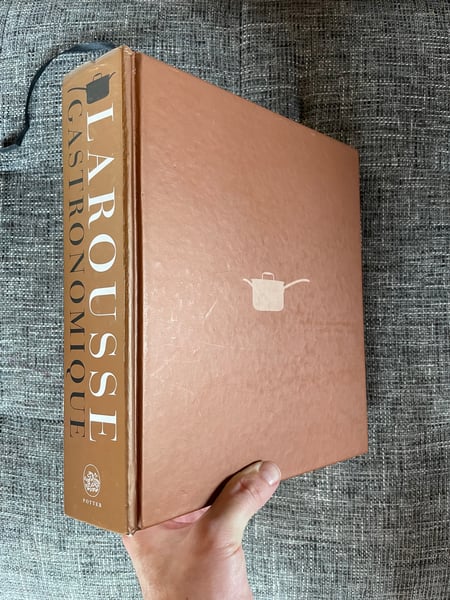 The dust jacket on this book is being kept safe in another location (I swear I know where), thus it is not pictured here.
The dust jacket on this book is being kept safe in another location (I swear I know where), thus it is not pictured here.
Larousse Gastronomique by Librarie Larousse
The definitive culinary encyclopedia. It's not perfect (fairly Eurocentric, even Franco-centric, fairly traditionally oriented), but it is staggeringly comprehensive when it comes to the world of food. It doesn’t just cover ingredients, but techniques, recipes (I’ve cooked from it on many occasions), equipment, chefs (including biographies), and food history. It may seem strange to have a print version of any kind of encyclopedia in the age of Google, but Larousse is indispensable not only because of the topics it covers, but also because of the wisdom housed in its entries, often times giving tremendously useful tips that would be hard to come by otherwise unless you had a master French chef coaching you through the recipe (or whatever it may be). Very useful for anyone cooking in the Western tradition, and a total game changer for anyone interested in French cuisine.
I hope this list helps you navigate the waters of budding culinary bibliophilia. These are just a tiny sample of what is out there. Anything you could want to know about food has likely been written about at one point or another, it's just a matter of tracking down the right book. And if you’re itching to put your newfound theoretical knowledge to practical use, and level up your cooking along the way, check out on of our upcoming Culinary Boot Camps. Happy reading!

